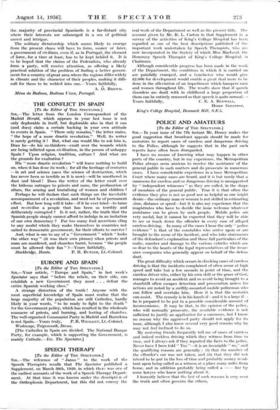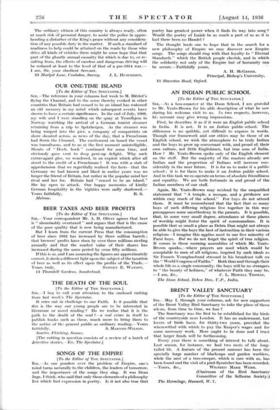POLICE AND AMATEURS
[To the Editor of THE SPECTATOR.] SIR,—In your issue of the 7th instant Mr. Honey makes the good suggestion that broadcast appeals should be made for motorists to report cases of careless and dangerous driving to the Police, although he suggests that in the past such reports have often been disregarded.
I have no means of knowing what may happen in other parts of the country, but in my experience, the Metropolitan Police always seem anxious to receive the assistance of the general public in such matters and do prosecute in numerous cases. I have considerable experience in a busy Metropolitan Court where many cases are heard, and it is but rarely that a summons for careless and/or dangerous driving is unsupported by " independent witnesses " as they are called, in the shape of members of the general- public. True it is that often the evidence they give is not as good nor as helpful as one might desire—the ordinary man or woman is not skilled in estimating distance or speed—but it is also my experience that the magistrates who have to decide the issue welcome whatever assistance can be given by such people. Mobile police are very useful, but it cannot be expected that they will be able to see or track down the offender in every case of alleged careless driving. In many of the cases I hear the only " police evidence " is that of the constables who arrive upon or are brought to the scene of the incident, and who take statements of the defendant's explanation and those full particulars of the make, number and damage to the various vehicles which are so dear to the hearts of the legal representatives of the insur- ance companies who generally appear on behalf of the defen- dant.
The great difficulty which occurs in checking cases of careless driving is that the incidents complained of often occur at high speed and take but a few seconds in point of time, and the careless driver who, either by his own skill or the grace of God, manages to avoid an accident and so avoid being brought to a standstill often escapes detection and prosecution unless his actions are noted by a swiftly-mounted mobile policeman who can follow and overtake him. Here it is that the motorist can assist. The remedy is in his hands if—and it is a large if—. he is prepared to be put to a possible considerable amount of inconvenience. It may be that, in the opinion of the police, who will normally prosecute, the available evidence is not sufficient to justify an application for a summons, but I know no reason why the aggrieved party should not apply for its issue, although I also know several very good reasons why he may not feel inclined to do so.
My motoring friends frequently tell me of cases of careless and indeed reckless driving which they witness from time to time, and I always ask, if they reported the facts to the police. Never have I been told" Yes "—it is an invariable " no," and the qualifying reasons are generally : (i) that the number of the offender's car was not taken, and (ii) that they did not intend to be put to the loss of time and probably money resul- tant upon being called as a witness at a place many miles froin home, and in addition probably being called a — liar by some lawyer who knew nothing about it.
I honestly believe that the last of such reasons is very near the truth and often governs the others.
The ordinary citizen of this country is always ready, often at much risk of personal danger, to assist the police in appre- hending a disturber of the King's peace without any considera- tion of any possible duty in the matter. If such a standard of readiness to help could be attained on the roads by those who drive all kinds of vehicles there might be some hope that that part of the ghastly annual casualty list which is due to, or re- sulting from, the effects of careless and dangerous driving will be reduced at least to the level of that of a pre-1914 war.— I am, Sir, your obedient Servant,
33 Marlpit Lane, Coulsdon, Surrey. J. L. Hurcarsorr.







































 Previous page
Previous page